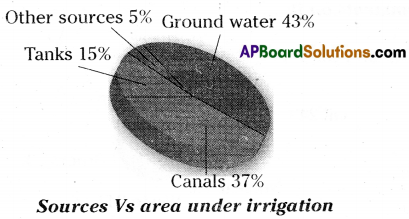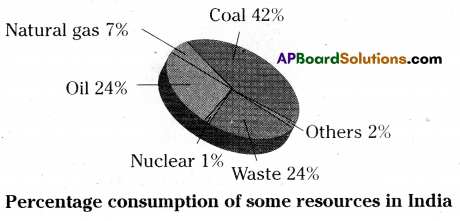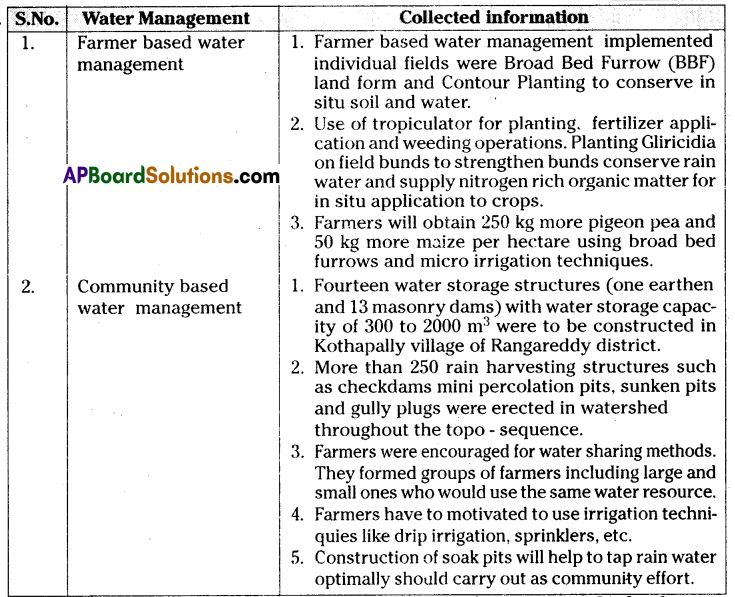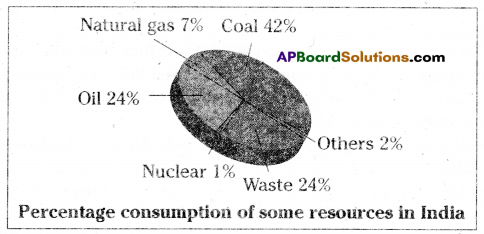These TS 10th Class Biology Chapter Wise Important Questions 10th Lesson Natural Resources will help the students to improve their time and approach.
TS 10th Class Biology Important Questions 10th Lesson Natural Resources
1 Mark Questions:
Question 1.
Suggest any two activities to check soil erosion in your school.
Answer:
- Observe the school ground after rain.
- Conduct a field project on soil erosion.
Question 2.
To create awareness on “Water conservation” in your locality, what slogan you will suggest?
Answer:
- “Don’t Waste Water”
- “Save every drop”
- “Water is life”
Question 3.
The symbol ![]() is there on the Item you bought. What it instructs?
is there on the Item you bought. What it instructs?
(OR)
What does the given logo indicate ? What does It mean? ![]()
Answer:
It is the Recycle logo. It indicate that the item we bought is prepared from recycled materials or the item can be recycled after use.
Question 4.
What happens If the forest area decreases rapidly?
Answer:
If the forest area decreases
- It destroys wild life habitat.
- It increases soil erosion.
- It releases green house gases into the atmosphere contributing to global warming.
- It also harms people who relay on forest for their survival, hunting and gathering, harvesting forest products or using timber and firewood.
![]()
Question 5.
Write two activities which you are performing to save the electricity.
Answer:
- We can reduce the consumption of electricity by putting off the fans and lights when there is no need.
- We can use LED (Lighting Emitting Device) bulbs to save electricity.
- To shut down laptops and computers when they are not in use.
Question 6.
Prepare two slogans on protecting non-renewable resources.
Answer:
- Use Biofuel – Reduce Fossil Fuel.
- Use alternative resources – Save the environment.
Question 7.
Write two examples for non-renewable resources.
Answer:
The examples for non-renewable resources are coal, petroleum and natural gas.
Question 8.
Write any two measures you take in your home to reduce consumption of electricity.
Answer:
- We can use LED (Light Emitting Device) bulbs to save electricity.
- We can reduce the consumption of electricity by putting off the fans and lights when there is no need.
Question 9.
What is sustainable development? Why it is needful for us?
Answer:
When we use the environmeht in ways that ensure we have resources for the future, it is called sustainable development. It is needed because development and conservation can coexist in harmony.
Question 10.
Expand ICRISAT
Answer:
ICRISAT stands for International Crop Research Institute for Semi-Arid Tropics.
Question 11.
When can we say that the water resource Is scarce in an area?
Answer:
According to United Nations Development Programme, Water resource is an area, where annual water supply drops below 1700 m3 per person, is becoming scarce”.
![]()
Question 12.
What is the prediction of the food and Agriculture Organisation of the United Nations regarding water scarcity?
Answer:
The food and Agriculture Organisation of the United Nations has predicted that by 2025, 1.8 billion people will be living in countries or regions with absolute water scarcity.
Question 13.
What is conservation?
Answer:
Conservation is the practice of caring for the resources, so all living things can benefit from them now and in the future.
Question 14.
Why are fossil fuels non-renewable?
Answer:
Fossil fuels are non-renewable. This is because it takes a long time for their formation while there consumption occurs very quickly.
Question 15.
What serves as a lung for the world?
Answer:
Forests serve as a lung for the world.
Question 16.
What is contour strip cropping? What is its use?
Answer:
- Contour strip cropping is a method of soil conservation.
- Several crops such as corn, wheat and clover are planted in alternating strips across a slope or across the path of the prevailing wind.
- Different crops with different roots systems and leaves, help to prevent soil erosion.
Question 17.
What is selective harvesting?
Answer:
The practice of removing individual plants or small groups of plant leaves, other plants standing to anchor the soil is called selective harvesting.
Question 18.
How many species are extinction every year ?
Answer:
Based on various estimates of the number of species on Earth, we could be losing anywhere from 200 to 100,000 species each year.
Question 19.
From where fossil fuels were produced?
Answer:
Fossil fuels were produced from the remains of ancient plants and animals.
Question 20.
Expand IUCN.
Answer:
IUCN stands for the International Union for the Conservation of Nature.
Question 21.
What is percolation tank?
Answer:
Percolation tanks are normally earthen dams with masonry structures where water may over flow.
Question 22.
What is micro-irrigation?
Answer:
Micro-irrigation is an irrigation method that saves water and fertilizers b allowing water to drip slowly to the roots of plants either on the soil surface or directly onto the root zone through network of valves, pipes, tubing. etc. Drip irrigation, sprinklers, etc., are collectively called as micro-irrigation.
Question 23.
Give an example of bio fuels.
Answer:
Seeds from the Jatropa curcas plant are used for the production of bio-fuel.
Question 24.
What are biodiversity hot spots ? What is the measure of the biodiversity?
Answer:
Forests are biodiversity hot spots. One measure of the biodiversity of an area is the number of species found here.
Question 28.
What is the effect of continuous depletion of ground water along coastal regions?
Answer:
The effect of continuous depletion of ground water along coastal regions will lead to movement of saline sea water into fresh water wells then spoiling their quality.
Question 29.
Write two points to be kept in mind while storing water in tanks.
Answer:
- Storage tank should not be located close to the source of contamination.
- It should be accessible for cleaning.
2 Mark Questions:
Question 1.
Why do we use fossil fuels judiciously?
Answer:
- Fossil fuels were produced from the remains of ancient plants and animals.
- They include coal, petroleum (oil) and natural gas.
- We need to use fossil fuels judiciously because they are non-renewable resources.
- We need to conserve fossil fuels so we don’t run out of them.
- The pollution caused by them when burnt, to limit our fossil fuel use.
- Future generations may not get these resources.
- Balance in the nature will be disturbed.
- Electricity production will be stopped.
- Vehicles running with fossil fuels become useless.
![]()
Question 2.
Write two suggestions to create awareness on groundwater conservation.
Answer:
- We need to adapt different methods to improve the quality and increase the quantity of groundwater.
- We should dig water harvesting pits for every house.
- We should clean the silt, mud fill in tanks and ponds.
- We should prohibit the establishment of borewells for extraction of groundwater for agricultural and industrial use.
- These measures will Improve quality and quantity of groundwater.
Question 3.
Suggest four measures to conserve fossil fuels.
Answer:
- Usage of alternatives to fossil fuel.
- Minimise the usage of fossil fuel.
- Walk, ride by bicycle and use public transportation whenever possible.
- Purchase energy efficient appliances.
- Turn off light and other electronics when you are not using them.
Question 4.
What is the importance of 4R’s In achieving the goal of “SwachhBharat”?
Answer:
- Reduce the production of garbage.
- Reuse the garbage for the production of manure and electricity.
- Recycle the garbage by separating it as dry and wet garbage.
- Recover the plants.
Question 5.
The Indiscriminate digging of Borewefls may result In what type of consequences in future?
Answer:
- Due to over drilling of borewells and pulling out water by electric motors, the ground water level is decreasing day by day.
- It is goes on without recharging, ground water becomes scarce.
- It shows impact on agriculture and the productivity will decrease.
- Fluorine levels in ground water will increase.
- Sometimes, saline water may intrude into the interior places of land and water becomes unfit for consumption.
- Farmers have to drill the bore wells to more depths which increase the losses for them.
Question 6.
Ramaiah made broad bed furrow around his field under employment guarantee scheme. Guess the reasons for it? If all the farmers of your village work together, will their water scarcity meet?
Answer:
The reason for Ramaiah making broad bed furrow around his field was, it is useful to conserve soil and water, fertilizer application weeding operations. It also conserve rain water. The farmers are over coming the water scarcity by sharing water available in the village. They formed groups of farmer including large and small ones who would use the same water resource. Farmers were also motivated to use irrigation techniques like drip Irrigation.
Question 7.
Write a short note on the distribution of water on earth.
Answer:
- Out of all the water on earth, salt water in oceans, seas and saline ground water make up about 97% of it.
- Only 2.5- 2.75% is fresh water.
- 1.75 – 2% of this is frozen in glaciers, ice and snow.
- 0.7 – 0.8% of water is present as fresh ground water and soil moisture.
- Less than 0.01% of water is present as surface water in lakes, swamps and rivers.
- Though this fresh water is a meagre portion of the whole, if used judiciously, shall last for a long time.
Question 8.
What are the disadvantages of deforestation ?
Answer:
- Deforestation destroys wildlife habitats.
- Deforestation increases soil erosion.
- It also releases greenhouse gases into the atmosphere, contributing to global warming.
- Deforestation accounts for 15 percent of the world’s green house gas emissions.
- Deforestation also harms the people who relay on forests for their survival, hunting and gathering, harvesting forest products or using the timber for firewood.
![]()
Question 9.
What is the importance of soil as a natural resource?
Answer:
- Soil is vital to food production.
- We need high-quality soil to grow the crops that we need.
- Soil is also important to plants that grow in the wild.
- Many other types of conservation efforts, such as plant conservation and animal conservation depend on soil conservation.
Question 10.
What is “Biodiversity”? What is its Importance?
Answer:
- Biodiversity is the variety of living things that populate the earth.
- The products and benefits we get from nature relay on biodiversity.
- We need a rich mixture of living things to provide foods and building materials, as well as to maintain a clean and healthy landscape.
- We need to protect biodiversity to ensure we have plentyful and varied food sources.
- Biodiversity is important for more than just food. For instance, we use between 50,000 to 70,000 plant species for medicines world wide.
Question 11.
How can we conserve fossil fuels?
Answer:
- Everyone can help conserve fossil fuels by using them carefully.
- Turn off lights and other electronics when you are not using them.
- Purchase energy – efficient appliances.
- Walk, ride a bike. Carpol and use public transportation whenever possible.
- It is better to prefer public transport system like bus or train instead of travel in personnel vehicles.
- Scientists are exploring alternatives to fossil fuels.
- They are trying to produce renewable biofuels to power cars and trucks.
- They have successfully produced electricity using the sun, wind, water, etc. So such source of energy should be encouraged.
Question 12.
What is the state of Minera is as a resource ? Mention two methods that help to conserve mineral resources.
Answer:
- Earth’s supply of raw mineral resources is in danger.
- Many mineral deposits that have been located and mapped have been depleted.
- As the ores for minerals like aluminium and iron became harder to find and extract, their prices go up.
- This makes tools and machinery more expensive to purchase and operate.
- Many mining methods, such as mountain top removal mining (MTR); devastate the environment.
- They destroy soil, plants and animal habitats.
- Many mining methods also pollute water and air as toxic chemicals leak into the surrounding ecosystem.
- Less wasteful mining methods and the recycling of materials will help conserve mineral resources.
Question 13.
Write about the four ‘Rs that can save environment.
Answer:
The four ‘R’ s that can save environment are:
- Reduce
- Reuse
- Recycle and
- Recover
1. Reduce: That is useless if you can afford to save water, repairing leaky taps and avoiding a shower or switching off unnecessary lights and fans.
2. Reuse: Things that you often tend to throw away, like paper that would save plants and wrapping papers that would minimise pollution.
3 Recycle: It is the process of converting waste materials into new materials and objects.
Ex: Some metals, glass, paper, etc. Recycling may not always be a very good option hut useful to conserve certain minerals. In Japan for example, car manufacturers recycle many raw materials used in making automobiles. In United states, nearly one-third of the iron produced comes from recycled automobiles.
4 Recover: When we cut trees to construct industries or roads for transportation, it is important to grow trees in another areas.
Question 14.
Why is recycling of plastic not a very good option?
Answer:
- Recycling of plastic may not always be a very good option as recycling plastic is a tricky process and can cause havoc.
- The chief problem lies in plastic’s complexity.
- There are as many types of plastic as their are uses.
- Since each type can only be recycled with its own kind, plastics need to be carefully sorted before they can be processed.
![]()
Question 15.
Draw the recycling logo.
Answer:

Question 16.
Draw the logo of sustainable development.
Answer:

Question 17.
Draw a pie diagram to show, the water sources and area under irrigation in our state.
Answer:

Question 18.
Why is scarcity of water there in our country in spite of nature’s monsoon bounty (large quantities)?
Answer:
It has taken place (due to the following reasons.
- Failure to sustain water availability under ground which has resulted largely from the loss of vegetation cover.
- Diversion for high water demanding crops.
- Pollution from industrial effluents and urban wastes.
Question 19.
Why is dependence of man on nature greater than that of any other organism?
Answer:
Man’s dependence on the environment is greater than that of other organisms because man
- Develops curiosity for more comforts and security.
- Consumes large amount of material and energy.
- Develops a new kind of socio-ecorìomic environment which consists of things developed by man through tools and techniques.
![]()
Question 20.
In addition to low rainfall, what are the other reasons for non availability of water in some regions of our country?
Answer:
- Flowing of rain water and lack of management to harvest it.
- Ground water is pumped out for high water departing crops.
- Water becomes unsafe and unusable due to mixing of urban wastes and effluents from the industries.
Question 21.
Write the advantages of giving control of water management to the residents of the area.
Answer:
- Water harvesting techniques are highly locality specific and the benefits are localised.
- Thus giving people control over their local water resources ensures that mismanagement and over exploitation of these resources is reduced.
Question 22.
What are the benefits of water harvesting?
Answer:
- Provides self sufficiency to water supply.
- Conserves valuable ground water.
- Reduces cost for pumping ground water.
- Reduces local flooding and drainage problems.
Question 23.
Why are environmentalists insisting upon substantial natural resource management ? Give any four reasons.
Answer:
- Non-renewable resources are limited. We should use them judiciously.
- We should encourage the use of renewable resources.
- We should preserve the environment for future generations.
- The benefits of the controlled exploitation should go to local people.
Question 24.
Observe the given diagram on percentage consumption of some resources in India. Add your comments on it.
Answer:
The above diagram shows the percentage consumption of various resources in India.

- The diagram shows that we are greatly dependent on fossil fuels for our energy resources.
- The percentage consumption under fossil fuels amounts to 73% coal being the highest consumed resource (42%) followed by oil (24%) and natural gas (7%).
- Very little percentage of resources were used under others (2%) and nuclear resource (1%).
- The most significant feature is that we are losing around 24% of resources as waste. This should he minimised to conserve usage of resources.
4 Mark Questions:
Question 1.
Forests are renewable resource. Write four sentences supporting this.
OR
“Forest is a renewable resource.” Do you agree? Justify.
Answer:
- Forests are rich habitat for plants and animals. Forests serve as a lung for the world and a bed of nutrients for new life to prosper.
- Pure air from forests protects the earth from green house effect by removing carbon dioxide and converting it into oxygen.
- Many fruits, medicines, dyes, sandle wood and bamboo is obtained from forest by local people.
- Forests provide employment to large number of people and also help in generating revenue.
![]()
Question 2.

Observe the above table and answer the following questions.
1. Which crop is most suitable to cultivate for small farmer in both the villages?
Answer: Cotton, paddy
2. If you are a large farmer, which crop do you select to cultivate?
Answer: Cotton, paddy, mirchi.
3. What similarities you have identified In village A and village B?
Answer: Small and large farmers cultivated same type of crop in both villages. Large farmer gets more income per acre on crops than small farmer in both the villages.
4. Which is the lowest income crop?
Answer: Mirchi.
5. Is there any relationship between production of crops and income? How?
Answer: Commercial crops are good for income. Income may or may not related to production of crop. It depends upon demand of the market.
Question 3.
Read the given information and answer the following questions.
A survey was conducted in two villages, Vanaparthy and Voddiche ria of Warangal district in Telan gana State. The first with no scarcity and the second with scarce groundwater. Well census was curried Out in the villages in order to get a complete picture of well irrigation and its status as well as the availability of water. There are no alternative sources of supply as against wells in Vaddicherla, where there is an existing tank that has been converted into a percolation tank, so the water situation is much better in Vano party.
i. Why did they conduct survey?
ii. What are irrigation resources in Telangana State?
iii. In which village, do you suggest drip irrigation?
iv. Why is the water situation much better in Vanaparthy village compared to Vaddlcherla?
Answer:
i. A compartive study on available water resources irrigation method in the Vaddicharla and Wanaparthi of Warangal district of Telangana state.
ii. Lakes, wells, canals and ground water, etc.
iii. Vaddicherla.
iv. Existing tank has been converted into a percolation tank.
![]()
Question 4.
Observe the Pie diagram and answer the following questions.

i. Identify the fossil fuels from the above diagram.
Answer:
Coal, natural gas, oils are fossil fuels.
ii. Why wastes should be considered as primary energy source in future?
Answer:
The fossil fuels may be exhausted in future. So we may be considered that wastes are primary alternative energy resources.
iii. Why can’t we depend on fossil fuels forever?
Answer:
We can’t depend on fossil fuels forever because fossil fuels are non-renewable resources.
iv. What are the alternatives for fossil fuels?
Answer:
Solar energy, wind energy, tide energy, nuclear energy, energy from waste materials.
Question 5.
Explain the Importance and implementation of community based Interventions and farmer based Interventions for water management.
Answer:
Community based Interventions:
- For water harvesting, there is an urgent need to construct earthen and masonry dams. They help us to store rain water during rainy seasons. They are help in increasing the ground water table.
- Construction of percolation pits and field bunding are very helpful in the harvesting every rain drop.
- Open dry wells near nalla canal were recharged by building dykes or barriers in the nalla and maintaining the run-off rain water. The ground water is recharger these community-based Interventions.
Farmer based interventions:
- Broad Bed Furrow (BBF) land form and contour planting methods are very useful to conserve soil, water and fertilizer application and weeding operations.
- Planting Gliricidia, a leguminous plant adapted to grow in dry areas on field bunds to strengthen them and make the soil nitrogen rich.
- Farmers were encouraged to use water resource jointly and irrigate land using micro irrigation methods like sprinklers and drip irrigation.
![]()
Question 6.
Explain the farmer based and community-based interventions to conserve soil and water resources.
Answer:

Question 7.
“The humans who were developed by us the natural resources, today has econ the reason for destroying them”. Explain analytically.
Answer:
“The humans who were developed by using the natural resources, today has become the reason for destroying them” This statement is absolutely true.
1. Primitive man lived in forests and hills. H used the natural resources for his livelyhood. He worshipped nature and used them wisely for his development.
2. After his development, he becomes greedy and using the natural resources and is criminately and held responsible for their destruction.
3. To meet the needs of growing population, industrialization, urbanization, and huge constructive activities, man utlilsed natural resources indiscriminately. At the same time, he did not planned for their revival.
4. But now he realised the importance of natural resources and taken up steps for their conservation. The concept of “Sustainable development” is being implemented in natural resource management.
5. He focussed on development of alternatives for fossil fuels, conservation of water and soil at community level and farmer based interventions.
6. Now he is so keen on conserving forests, wild life and biodiversity.
7. He is so cautious in minimising the utilization of natural resources by following 4’R principle in the day today life
[R — Reduce, R — Reuse, R — Recycle, R — Recover]
8. Now, he is adopting micro-irrigation methods like sprinklers and drip irrigation to minimise the water usage in low water available areas.
![]()
9. He is very Interested in following eco-friendly techniques, natural farming methods, using biofertilizers,vermicompost and natural pest control methods in place of toxic chemical pesticides.
I. Conceptual Understanding
Question 1.
Write a short notes on the role of Governments and other organisations in conserving resources.
OR
Write a short note on IUCN.
Answer:
- Governments enact laws defining how land should be used and which areas should be set aside as parks and wildlife preserves.
- Governments also enforce laws designed to protect the environment from pollution, such as requiring factories to install pollution-control devices.
- Finally, governments often provide incentives for conserving resources.
- Many international organizations are also dedicated to conservation.
- Members support causes such as saving rain forests, protecting threatened animals, and cleaning up the air.
- The International Union for the Conservation of Nature (IUCN) is an alliance of governments and private groups founded in 1948.
- The IUCN works to protect wildlife and habitats.
- In 1980, the group proposed a world conservation strategy.
- Many governments have used the IUCN model to develop their own conservation plans.
- In addition, the IUCN monitors the status of endangered wildlife, threatened national parks and preserves and other environments around the world.
Question 2.
What programmes are you going to conduct to create awareness among farmer in your locality on waste land development?
Answer:
I will conduct following awareness programmes for farmers n our locality on waste land development.
- Conducts awareness programmes on soil importance how soil important for life.
- Growth of population is very rapid and cultivated land not increasing any more.
- Already tertile land being using for construction of house, factories and institutions land for cultivation becoming less day by day.
- Hence construction of new cities, airports, industries, institutions, it is better to use waste land.
- To increase the cultivated lard I will motivate the local farmers to bring waste land into cultivated land.
![]()
Question 3.
What changes would you suggest hi your home in order to be environment friendly?
OR
Write about the 4 ‘R’s needed in the protection and conservation of the environment.
Answer:
By pursuing tile maximum of tour R’s i.e., Reice, Reuse, Recycle and Recover, we can save the environment in an effective way.
1. Reduce: It want to use less, I would save electricity by switching off unnecessary heights and farts. prefer walking or cycling than using a vehicle, turn off the engine of car at red light, repair leaky taps and would not waste food.
2 Recycle: It means to collect used things like plastic, paper, glass and metal items and recycle these materials to make required things instead of synthesizing or extracting fresh plastic, paper, glass or metal.
3 Reuse: It refers to use things again and again. Fur example, instead of throwing away used envelopes, they can t)e used by pasting new labels.
4. Recover: We should implement ‘recover’ to prevent environmental threat. For example, when we cut trees to construct industries or roads for transportation, it is important to grow trees in another area.
II. Asking Questions And Making Hypothesis
Question 1.
The wells and tanks in your village become dry. Ground water levels decreased.
OR
Assume the causes for this. Will there be no water scarcity if all the farmers of your village work collectively?
Answer:
Causes for decreasing ground water levels:
1. Varying monsoon behaviour in recent years, there is pressure on ground water utilization.
2. Indiscriminate tapping of ground water in our village by too much drilling construction of deep tube wells and bore wells have resulted in over exploit on and depletion of ground water resources.
3. There will be no water scarcity if all the farmers of our village work collectively. Farmers in our village were encouraged to use water resource jointly and irrigate land using micro irrigation techniques. By using micro irrigation techniques farmers in our village obtained more crop yield. Farmers in our village follow the micro irrigation method i.e. drip irrigation and can reduce water consumption by 70% in our village.
III. Communication Through Drawing, Model Marking
Question 1.
Draw a pie diagram showing percentage consumption of some resources in india.
Answer:

IV. Application to Daily Life, Concern to Bio-Diversity
Question 1.
Think that there is much scarcity of water for drinking and cultivation in your village. What advice do you give to prevent this?
OR
How do you overcome the problem of water scarcity in your village?
Answer:
- Motivate the people to conserve water.
- I will educate the people to avoid wastage of water whenever possible.
- Construction of recharge pits in the house, school and in the open areas to increase the underground water level.
- Planting trees wherever possible in the village, particularly in the vacant lands.
- Educate the farmers about the micro irrigation system like drip irrigation, sprinklers, etc.
- Encourage the farmers to form groups to share available air among themselves.
- Construction of percolation tanks in the low-lying areas of the village.
Question 2.
For which works fossil fuels are used in your house? What measures do you take to conserve them?
Answer:
Fossil fuels are sources of energy for cooking, heating and burning in our house holds. Petrol and diesel are being used in our house for transport and running generators and water pumps.
Measures to be taken to conserve fossil fuels in my house:
- I will put the food material to be cooked on the stove only after arranging all the things which are necessary for cooking.
- By using pressure cookers 20% gas on rice and 41.5% on meat would be saved when compared to other cooking means.
- We must reduce the flame as soon as the boiling process starts in a pressure cooker. This process saves nearly 35% of fuel.
- I will soak the food material before cooking. It saves 22% of fuel.
- I will cook food in broad and low depth vessel.
- I will keep Lid on the cooking vessel. If not, it takes more time to cook.
- For short distances to travel I will go by walk to save fuel for longer distance. I use public transport.
- Encourage people to use solar water heater and solar cooker.
Question 3.
How did centre for Wòrld Solidarity help the farmers in wanaparthy and Vaddicherla in recharging cells?
Answer:
- A project of the centre for world solidarity that addresses sustainability of ground water intervened to help in recharging wells that were drying up in the villages – of Wanaparthy and Vaddicherla.
- They encouraged more water sharing among farmers.
- They formed groups of farmers including large and small ones who would use the same water resource.
- Farmers were also motivated to use irrigation techniques like drip irrigation, sprinklers, etc.
- Construction of soak pits to tap rain water optimally was carried out as community efforts.
- Soak pits helped in recharging dried-up horewells.
- Dykes or harriers. nearly 30 cm thick of brick-cement or stone cement harrier, extending down to the compact bed rock, with mud or clay fillings were built in underground streams to tap ground water optimally.
- Thus center for world solidarity helped the farmers in Wanaparthy and Vaddicherla in recharging ground water.
Question 4.
To make people as a part in development. and environment protection sustainable development write some slogans.
Answer:
Some of slogans are follow
- Development essential. but at cost our own destruction.
- Development and environmental protection are like our two eyes.
- For today’s happiness development don’t spoil tomorrow (environment).
- Development with the destruction of our environment will not stand for long time.
- If you protect the environment, it will protect you for generations. (You can add some more Slogans )
![]()
Question 5.
What steps you would like to follow on your part to conserve biodiversity?
Answer:
- Biodiversity is the variety of living things that populate the earth.
- To conserve biodiversity we should avoid hurting.
- Sustainable forest conservation methods should be followed.
- I will actively participate Vana mahosthavam programmes.
- I will educate and encourage people and make them participate in conservation programmes
- Create awareness programmes and around school.
- Writing slogans and also make some posters about conservation of biodiversity.
- Judicious use of electricity wherever possible.
- Finding out of various alternative sources of energy.
- Plant the saplings in the habitat.
- Encouraging of social forestry.